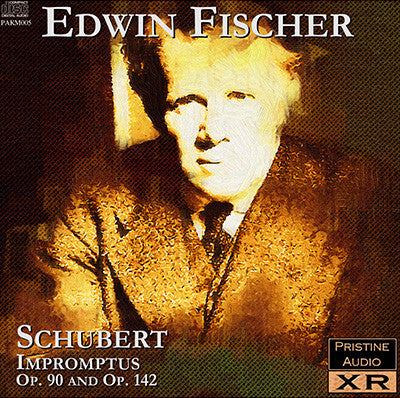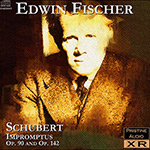
This album is included in the following sets:
This set contains the following albums:
- Producer's Note
- Full Track Listing
- Cover Art
Edwin Fischer's 1938 Schubert Impromptus
XR remastered for Pristine Classical
Edwin Fischer was, on the concert platform, a short, leonine,
resilient figure, whose every fibre seemed to vibrate with elemental
musical power. Wildness and gentleness were never far from each other in
his piano-playing, and demonic outbursts would magically give way to
inner peace. It was as little trouble to him (as Alfred Polgar once said
of an actor) to lose himself as to find himself. His playing of slow
movements was full of an unselfconsciousness beside which the
music-making of others, famous names included, seemd academic or
insincere. With Fischer, one was in more immediate contact with the
music: there was no curtain before his soul when he communicated with
the audience. One other musician, Furtwängler, conveyed to the same
degree this sensation of music not being played, but rather happening by
itself. His death was a grievous blow to Fischer.
(From Musical Thoughts & Afterthoughts, Alfred Brendel, 1960)
There are pianists whose playing is so predictable that if they fell
into a faint it would create a welcome diversion. Fischer could spring a
surprise at every note; he could also alarm you with his nerves, or
make your hair stand on end with his childish fancies (as in his
dreadful cadenzas!). There are pianists who hang on the music like
parasites, and there are the platform hyenas who devour masterpieces
like carrion. Fischer was a giver; he let out his breath and recommended
his pupils to practise exhaling every morning. (Inhaling, he said, was
easy.) This 'musical exhalation' was made possible by a singularly
relaxed technique. Though it also gave rise to some inaccuracies, these
in the end mattered little; the gain was overwhelming.
(From Afterthoughts on Edwin Fischer, Alfred Brendel, 1976)
Fischer,
particularly after the last war, was afraid of the microphone. The
recording he made of Brahms's F minor Sonata, for example, gives only
one glimpse -- at the entry of the D flat major 'patriotic' theme in the
last movement -- of his real conception of that work. Fortunately,
there are among his records some which come fairly close to the reality
of his playing. A few even set a standard of unmannered perfection which
transcends the bounds of fashion. Best among his earlier records, in my
opinion, are a number of wonderful Bach interpretations, as well as the
Schubert Impromptus and the Mozart Concertos K. 466 (D minor) and K.
491 (C minor)...
(From Afterthoughts on Edwin Fischer, Alfred Brendel, 1976)
These
1938 recordings of the Schubert Impromptus are rightly held up by
Brendel as examples of Fischer at his best. Each Impromptu should sound
almost freely improvised - here that feeling is conveyed perfectly,
along with a sense of inevitability, suggesting that there is no other
way to continue each piece to its perfect conclusion. Rightly starred in
the first UK edition of The Record Guide, this is the sound of a true
master at work.
Andrew Rose
-
SCHUBERT Four Impromptus Op. 90, D.899
-
SCHUBERT Four Impromptus Op. 142, D.935
Recorded 8, 9th Mar. 1938, Abbey Road Studios, London
Released as 6 HMV 78s, DB3484-3489
Matrix Numbers: 2EA6129-I, 2EA6130-I, 2EA4842-II, 2EA6131-II, 2EA6126-I, 2EA6127-I, 2EA6120-III, 2EA6121-II, 2EA6122-1, 2EA6123-I, 2EA6125-1, 2EA6124-III
Duration 52:49
Edwin Fischer, piano

